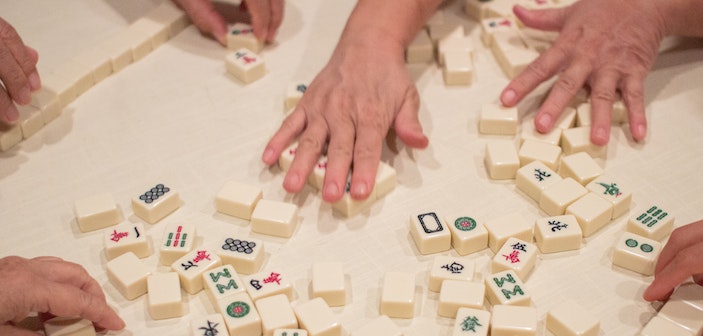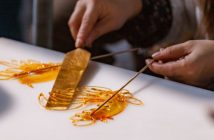My Beijing besties love games. As in, one of them packed her substantial collection of card and board games in her carry-on when she came over to China. So I wasn’t surprised when she enthusiastically told me, “Let’s learn Mahjong!” What did surprise me, however, was how much this game would come to affect my experiences here in China.
For those not familiar, I’ll give you a super quick rundown. Mahjong, a cross between gin and dominos, is the most popular game in the entire world. The basic idea is that four sets of three and a set of two tiles create a winning hand. But the truly interesting thing is that every region has its own variations on the rules. A quick Google search will show you Beijing, Shanghai, Singapore, and even Japan and the United States have their own twist on the game. Within regions, friend groups have their own house rules. Every person I have spoken to plays just a little differently. So, when you sit down at a table you are getting an inside look at a community.
We started by taking a basic class, and then had a friendly running game each week. At first, it was a way to pass the time while Covid-19 restrictions prevented us from meeting in groups in public, but eventually, it became an anchor for my week. Our friendly competitions led to a group bond where we shared our personal lives, the challenges we were all facing as we missed out on family events in our home countries, and the life hacks and apps that were making our time in pandemic-era Beijing just a little easier.
Once travel within China opened up, I realized what a gift Mahjong was as a tool for bridging the cultural divide. No matter where I went there was a group of locals playing the game. In Chengdu, Shanghai, and the shop next door to my apartment in Beijing, I would find a group of friends playing (much faster than I am capable of), and if I stopped to watch they would eagerly motion me over and try to tell me the “real” way to play. My friends have all been invited to join in local games as well. Annie, the original Mahjong instigator, and her husband were invited to a New Year’s Eve game with a group of Singaporean coworkers. Brenda G, a member of our Tuesday group, started playing regularly with her acupuncturist and his wife. And as we all were invited into these intimate groups something wonderful started to happen. We would come back to our Tuesday table and announce, “Guess what I learned!” Mahjong became a way to break down barriers and have real conversations about Chinese culture and different perspectives with our new local friends.
My favorite Mahjong moment occurred in Zhangjiagang about six months ago. Some friends and I were hiking the Avatar Mountains, and that night we noticed a Mahjong set in our hotel’s sitting room. We pulled it out and started up a game. The reception desk noticed, and soon the entire hotel staff was watching the tourists clumsily play. They were thrilled! The cook, a kindly-looking elderly grandfather, stood behind me and enthusiastically pointed out all the mistakes I was making in rapid-fire Mandarin. I didn’t understand a single word he was saying but we were still communicating. When the game finally ended, he patted me on the shoulder, gave me a thumbs-up, and said, “Hen hao, laowai!”
Mahjong has deepened and broadened my experience in China, and in my books that’s a “hu le” (I win!).
KEEP READING: Go Team Go! Olympic Lessons for Children of All Ages
Photo: Unsplash




